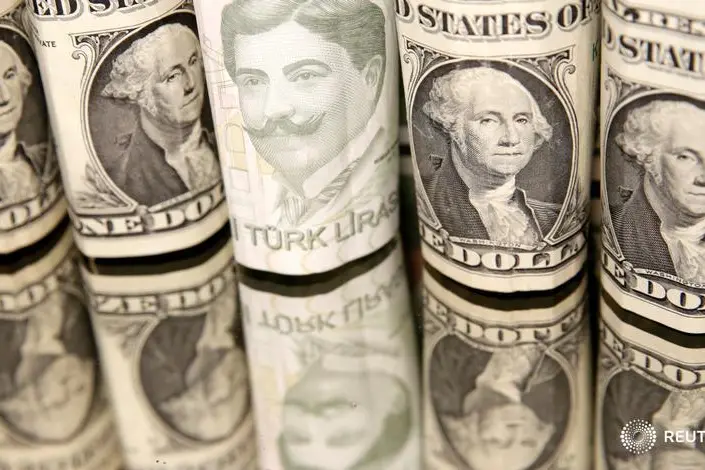PHOTO
ISTANBUL - A sharp selloff in Turkey's lira slowed on Thursday, when it slipped only 0.8% compared with a 7.2% plunge the day before, as traders said it was nearing more "normal" levels ahead of the expected appointment of a new central bank governor.
When the currency dropped on Wednesday, traders said it was a sign of authorities easing controls on the foreign-exchange market. When it steadied on Thursday, some said authorities were once more stabilising things by providing more liquidity.
"They are again defending the lira today," said one banker who requested anonymity.
The currency stood at 23.37 against the dollar at 1048 GMT. Earlier it touched a record low of 23.3965, bringing its losses to 20% this year.
In a sign of caution, Turkey's five-year credit default swaps (CDS) added 34 basis points from the Wednesday close, breaking back above 500 to hit 516 bps, data from S&P Global Market Intelligence showed.
The selloff a day earlier was the biggest since a historic crash in late 2021, after the central bank slashed rates in the face of rising inflation as part of President Tayyip Erdogan's unorthodox policies.
Economists said the lira's sharp drop was a signal that Ankara was moving away from state controls towards a freely traded currency, albeit there are numerous regulations and measures that are yet to be rolled back.
Traders said the currency should not depreciate as much as it did on Wednesday because it is nearing levels where it does not need to be defended through the use of reserves.
"There is no air of panic in the markets as in previous times when there were such high losses. On the contrary, there is a perspective of normalisation, which is important," a forex trader said.
Dollar-denominated bonds maturing in 2040 and 2045 suffered the biggest declines, down 1.2 cents, with others chalking up similar losses, Tradeweb data showed.
Under Erdogan's unorthodox programme, authorities have been taking a hands-on role in foreign exchange markets, using up tens of billions of dollars of reserves this year alone to hold the lira steady.
But following his re-election last month, Erdogan signalled a U-turn at the weekend by naming Mehmet Simsek, a former deputy prime minister well-regarded by foreign investors, as Turkey's new finance minister.
Simsek later said economic policy needed to return to "rational" ground and there were "no quick fixes" for policy.
CHANGE OF TACK
As part of the policy pivot, Erdogan is considering appointing Hafize Gaye Erkan, a U.S.-based senior finance executive, as central bank governor, Reuters reported on Monday.
Investors said they are awaiting that appointment and also a potential emergency rate hike - to around 25% from the current 8.5% - ahead of the central bank's next scheduled meeting on June 22.
Erkan would be the fifth central bank chief in four years and succeed Sahap Kavcioglu, who has spearheaded Erdogan's rate-slashing drive since 2021.
Under pressure from the president, a self-described "enemy" of interest rates, the bank under Kavcioglu cut its main rate to 8.5% from 19%, sparking a historic lira crisis in 2021 that sent inflation to a 24-year high above 85% last year.
Amid the policy loosening, authorities redirected forex and tapped reserves to stabilise the lira - until the Wednesday selloff.
"We see the lira correction as a realisation on behalf of Turkish policymakers that its liberal use of reserves to defend the currency has run its course for now," said Erik Meyersson, chief emerging markets strategist at SEB.
He said the lira could reach 27 against the dollar by the end of the year. "This is a downward revision to the value of the lira that reflects expectations of authorities trying to control the lira somewhat less," Meyersson wrote.
The central bank's net forex reserves hit an all-time low of negative $5.7 billion as of June 2, data showed on Thursday, with demand having surged through the elections.
Traders have said reserves could enter an upward trend, but they highlighted the threat posed to reserves from payments due to be made under a government scheme that protects lira deposits against forex depreciation.
(Additional reporting by Jonathan Spicer; Editing by Gareth Jones, Daren Butler and Hugh Lawson)





















